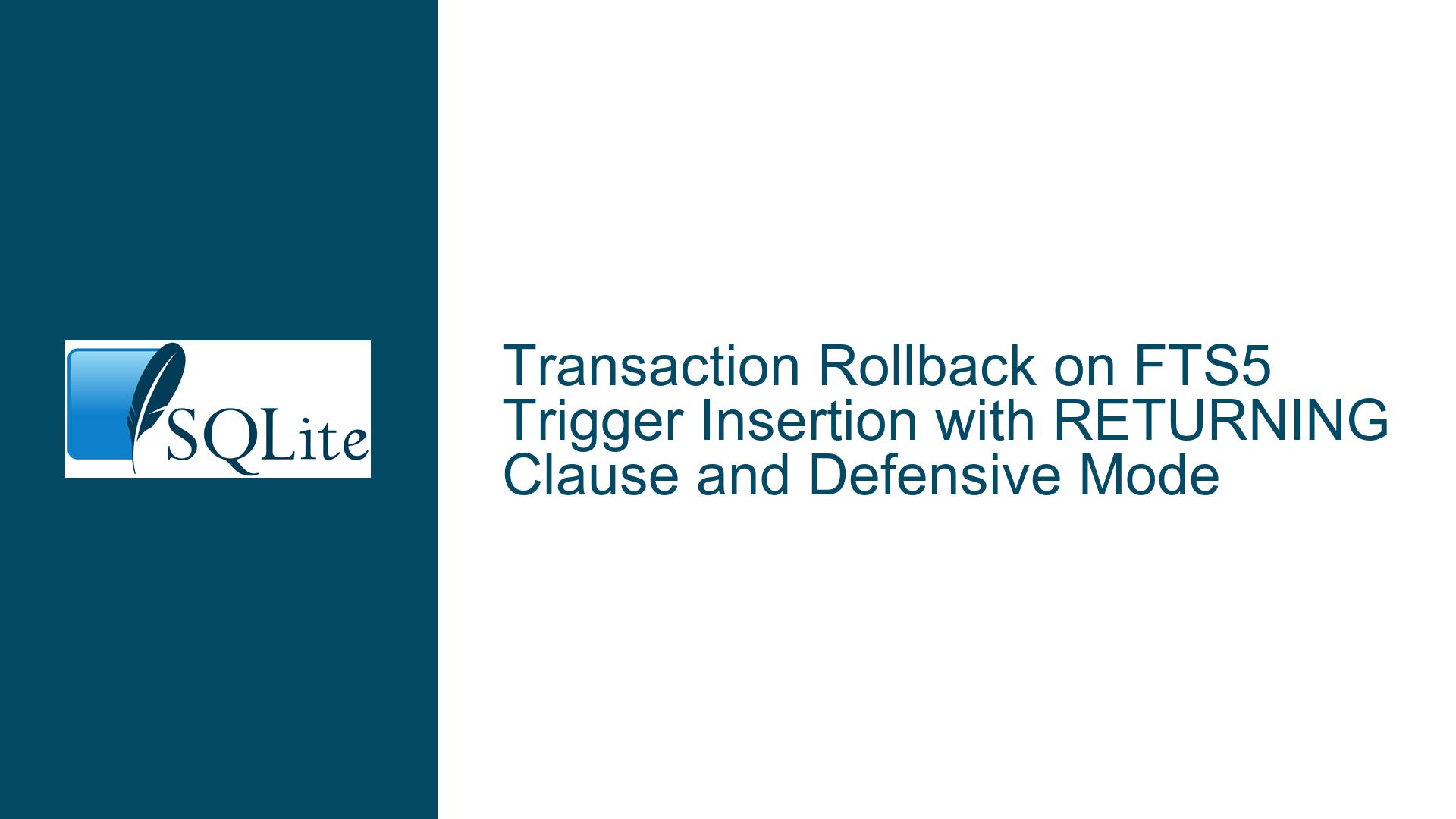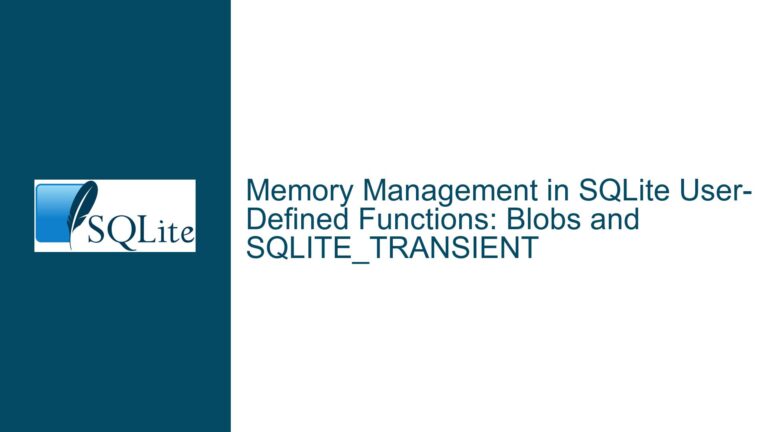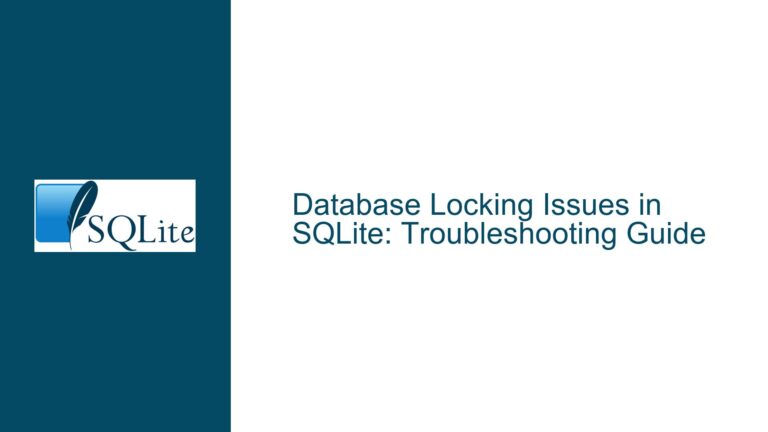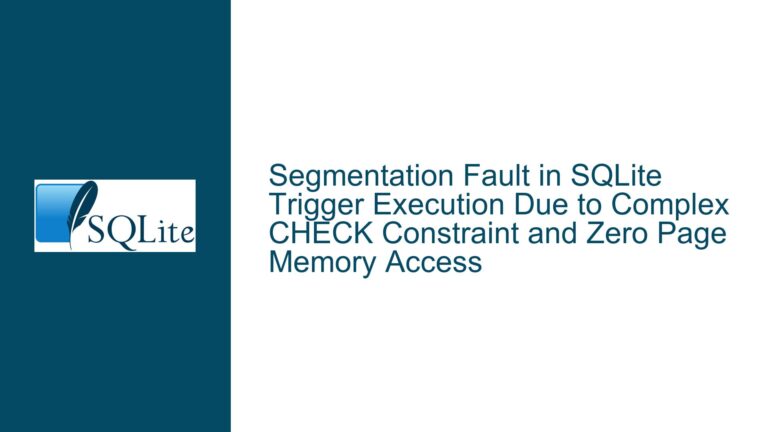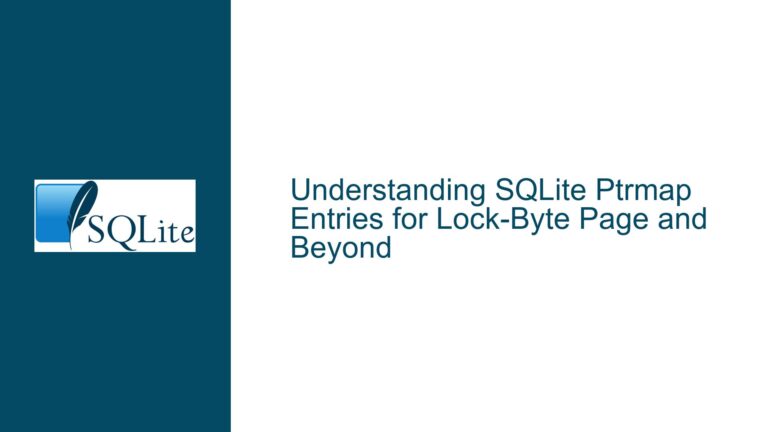Transaction Rollback on FTS5 Trigger Insertion with RETURNING Clause and Defensive Mode
Transaction Rollback Mechanism Conflict with FTS5 Triggers During Partial Statement Execution
Error Manifestation: Premature Statement Finalization After FTS5-Triggered Insert
The core issue involves an unexpected transaction rollback triggered by specific interactions between SQLite’s FTS5 virtual tables, BEFORE/AFTER INSERT triggers, RETURNING clauses, and the SQLITE_DBCONFIG_DEFENSIVE flag. This error manifests when all the following conditions align:
- Use of
RETURNINGClause inINSERTStatements: TheINSERToperation includes aRETURNINGclause to retrieve column values from the newly inserted row. - Partial Execution via
sqlite3_step(): The prepared statement is advanced once usingsqlite3_step(), returningSQLITE_ROW, but not advanced again to reachSQLITE_DONE. - Trigger-Driven FTS5 Table Modification: A
BEFORE INSERTorAFTER INSERTtrigger on the target table modifies an FTS5 virtual table. - Defensive Mode Activation: The database connection has enabled
SQLITE_DBCONFIG_DEFENSIVEto restrict unsafe operations.
Under these conditions, calling sqlite3_reset() or sqlite3_finalize() on the prepared statement returns an error (code 1), forcibly rolling back any active transaction. The error message typically indicates an attempt to modify a virtual table in a way that violates defensive mode constraints, even though the FTS5 insertion was explicitly permitted via the trigger.
Critical Observations:
- Transaction State Sensitivity: The error occurs only when the connection is in an explicit transaction (autocommit disabled) and has never successfully inserted into the FTS5 table during its lifetime. Prior successful inserts into the FTS5 table (even if rows are later deleted) immunize the connection against the bug.
- Connection-Specific Behavior: The error is tied to the database connection’s internal state, not the database file itself. Fresh connections remain vulnerable even if other connections have modified the FTS5 table.
- Step Completion Mitigation: Advancing the statement to
SQLITE_DONEby callingsqlite3_step()twice avoids the error, implying incomplete cleanup of internal resources when the statement is finalized mid-execution.
Underlying Causes: FTS5 Initialization, Defensive Mode Checks, and Transaction Atomicity
FTS5 Virtual Table Initialization and Transaction Context
FTS5 virtual tables require specialized handling due to their in-memory optimization structures (e.g., segment indexes, hash tables). When an FTS5 table is first modified in a transaction, SQLite initializes internal write-ahead log (WAL) structures to ensure atomicity. If a connection has never modified the FTS5 table, this initialization is deferred until the first insertion.
In the error scenario, the trigger-induced FTS5 insertion occurs during a transaction that has not yet initialized FTS5 write-handling structures. Defensive mode (SQLITE_DBCONFIG_DEFENSIVE) enforces strict checks to prevent unsafe operations, including direct writes to shadow tables. However, the interaction between deferred FTS5 initialization and mid-statement finalization creates a race condition where defensive mode misinterprets the cleanup of partially initialized FTS5 structures as an illegal operation.
RETURNING Clause Execution Flow
The RETURNING clause alters the execution lifecycle of INSERT statements. Normally, INSERT is a single-step operation: sqlite3_step() returns SQLITE_DONE immediately. With RETURNING, the statement becomes a generator of rows, requiring multiple calls to sqlite3_step()—first returning SQLITE_ROW for each row in the result set, then SQLITE_DONE.
When the application stops at SQLITE_ROW and finalizes the statement prematurely, SQLite must unwind the partial execution. This includes rolling back any side effects that were not yet committed. However, FTS5 triggers complicate this rollback because their modifications to virtual tables are not fully integrated into the transaction’s atomicity guarantees when defensive mode is active.
Defensive Mode and Virtual Table Interactions
Enabling SQLITE_DBCONFIG_DEFENSIVE prevents direct modifications to SQLite’s internal schemas (e.g., sqlite_master), shadow tables, and other low-level structures. FTS5 relies on shadow tables for content storage, which defensive mode typically protects. However, legitimate FTS5 operations via INSERT/DELETE commands are permitted.
The error arises because the mid-statement finalization during FTS5 initialization triggers a defensive mode check that incorrectly flags the cleanup of temporary FTS5 structures as an unauthorized modification. This is a false positive caused by overlapping resource management between the trigger’s FTS5 insertion and the defensive mode’s enforcement logic.
Resolution: Ensuring FTS5 Initialization Completeness and Statement Lifecycle Integrity
Immediate Workarounds
- Complete Statement Execution: Always call
sqlite3_step()until it returnsSQLITE_DONE, even forRETURNINGclauses. This ensures all internal resources are properly cleaned up.sqlite3_stmt *stmt; int rc = sqlite3_prepare_v2(db, "INSERT ... RETURNING id;", -1, &stmt, NULL); while ((rc = sqlite3_step(stmt)) == SQLITE_ROW) { // Process returned row } assert(rc == SQLITE_DONE); sqlite3_finalize(stmt); - Preemptive FTS5 Initialization: Before executing sensitive transactions, perform a dummy insertion and rollback to initialize FTS5 structures:
BEGIN; INSERT INTO b (name) VALUES ('dummy') ON CONFLICT DO NOTHING; ROLLBACK; - Temporarily Disable Defensive Mode: If feasible, disable
SQLITE_DBCONFIG_DEFENSIVEfor connections that modify FTS5 tables via triggers.
Code Fixes and Long-Term Solutions
- SQLite Patch Application: Apply the fix committed in c8601d83fbecf84c, which addresses the premature cleanup of FTS5 resources during statement finalization. This patch ensures defensive mode checks are bypassed during the teardown of partially initialized virtual tables.
- Connection State Tracking: Enhance the connection object to track whether FTS5 modifications have occurred, bypassing defensive checks during initial FTS5 setup if no prior modifications exist.
- Transaction Atomicity Enforcement: Modify FTS5’s transaction handling to explicitly register its initialization steps with the main transaction, ensuring defensive mode recognizes them as legitimate.
Best Practices for Trigger and FTS5 Usage
- Avoid Triggers for FTS5 in Defensive Mode: Redesign schemas to handle FTS5 updates via application logic rather than triggers when defensive mode is required.
- Isolate FTS5 Modifications: Perform FTS5 insertions in separate transactions or connections to minimize interactions with defensive mode checks.
- Monitor SQLite Versions: Track SQLite releases for follow-up patches, as the original fix (v3.37.0) did not fully address transaction-scoped initialization issues.
Testing and Validation
- Reproduction Script: Extend the provided minimal example to include transaction wrappers and connection state isolation:
int test(sqlite3* db) { exec(db, "BEGIN;"); // Original test code exec(db, "COMMIT;"); } - Integration Tests: Implement test cases that cycle connections, toggle defensive mode, and stress FTS5 triggers with
RETURNINGclauses under varying transaction states.
By addressing both the technical roots of the error and adopting defensive coding practices, developers can mitigate this issue while awaiting comprehensive fixes in future SQLite releases.
